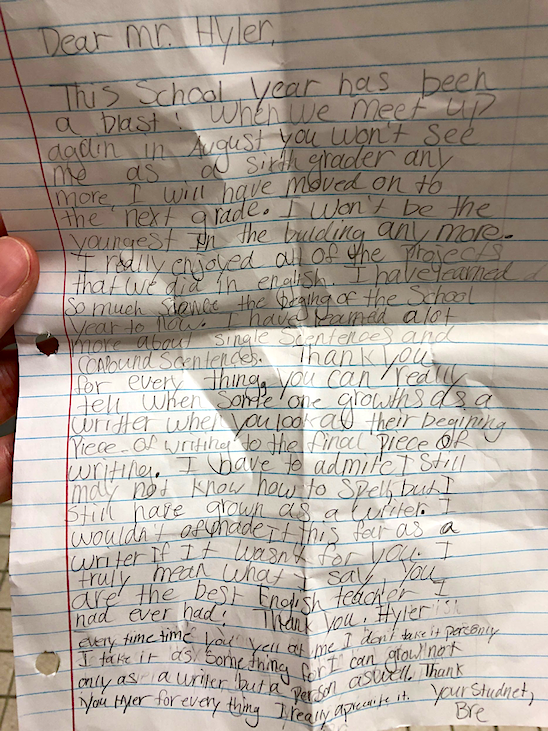A Very Challenging Year Teaching Middle School
 I just wrapped up my 17th year of teaching, I think. Quite honestly I have lost track.
I just wrapped up my 17th year of teaching, I think. Quite honestly I have lost track.
This school year, teaching both 6th and 7th grades, was one of my most demanding. Although I did teach sixth grade for one year very early in my career, a classroom full of 11 and 12 year olds felt very new. And while I’m a veteran 7th grade teacher (13 years) this past year’s group of 7th graders ranked very high on the all-time challenge scale.
However, there were also some really great things that came out of the experience. Despite the sometimes wild roller coaster ride, I am still standing strong and ready to make changes for next year to improve instruction, classroom behavior, and my leadership skills.
6th Grade
For the first time since my second year of teaching, I was assigned to teach 6th grade English. It was also the first year that our 6th graders have been in our middle/high school building (as our K-6 shifted to K-5).
The beginning of the year started off rough. I spent the better part of two weeks trying to figure out what exactly I was going to do with these younger students. Obviously I had the Common Core Standards to help guide me, but in terms of specific assignments, it was time to start all over with lesson design.
I reached out to former 6th grade teachers in my district, but any help they were able to give came from the perspective of their elementary experience. I also reached out to my personal learning network (PLN) on Twitter and received some really great advice and resources to help get my year going.
Throughout the year I learned what was too much for 6th graders to handle and also when and where I could push them more. For instance, I learned that for 6th grade students a 1-2 page paper is sufficient and by keeping the requirements manageable, students of all writing levels could feel some success.
This question involved me in some conversations with other colleagues and individuals within my PLN. I must say that generally I am not one to throw out page lengths to my students. My go-to line when students ask “how long does it have to be?” has always been “as long as it needs to be to meet the guidelines and requirements.” However, there are still those students who need to have that end mark in mind while doing their writing.
Besides writing skills, I learned that my 6th grade students needed and could be pushed to do more informational reading. One of the biggest hurdles they had to get over this year was their misplaced trust in the internet. As they did their online research, we frequently discussed why they couldn’t believe everything they read. I showed them how to detect likely falsehoods and how to follow up on suspect content by looking at additional resources.
Throughout the year it was clear that the 6th graders needed to read more nonfiction and move beyond the bubbles they exist in on a daily basis – bubbles shaped in part by our digital culture and also by the tribal aspects of adolescent life.

Overall, getting back to teaching 6th grade has allowed me to explore new possibilities for all my students because I have a clearer idea of how they “arrive” as they first enter the middle grades. I’ve broadened my knowledge of middle school, and I plan to make the effort to share my experiences with other middle grades teachers and encourage some engaging conversations where ideas can be traded to help our students more and more every day.
Dear Mr. Hyler,
This year has been a blast! When we meet up again in August, you won’t see me as a sixth grader anymore. I will have moved on to the next grade. I won’t be the youngest in the building anymore.
I really enjoyed all of the projects that we did in english. I have learned so much since the begining of the school year to now. I have learned a lot more about single sentences and compound sentences. Thank you for everything, you can really tell when someone (grows) as a writer when you look at their begining piece of writing to the final piece of writing. I have to admite I still may not know how to spell, but I still have grown as a writer.
I wouldn’t of made it this far as a writer if it wasn’t for you. I truly mean what I say, you are the best English teacher I had ever had! Thank you, Hyler. Every time you yell at me I don’t take it personly. I take it as something (from which) I can grow not only as a writer but a person as well.
Thank you Hyler for everything. I really apreciate it. Your studnet, Bre.
7th Grade
Teaching 6th grade for the first time in 13 years was bliss compared to my 7th grade class. This class posed more challenges than I’d ever had before. Every day when I drove to school I would think “I’ve seen everything now.” Boy, was I always wrong. Just when I thought I’d seen their best curve ball, they would throw five or six more at me.
Academically, my 7th grade students did fairly well. One of the biggest challenges was helping individual students realize that they do have strengths and weaknesses. Often, the kids with behavior issues were the students who couldn’t see value and reasons for self worth in anything they did. Unfortunately, there were a lot of them among my 7th graders this past year. I won’t soon forget the student who said, “diplomas are for nerds.”
Thinking back, I can say that this particular group of students had more discipline issues than any other class I have taught. It wasn’t just in my class either – it was everywhere in our 7th grade classrooms. I had never before seen behavior like this. It has really caused me to rethink discipline and expectations in my own classroom.

This new policy has stemmed from several students feeling they did not have to give up their cellphones and even assuming that they could get up in the middle of instructional time and make a phone call. (I also plan to be much more deliberate in teaching students how to use their phones responsibly.)
With behavior often out of control, and cellphones being a huge daily sticking point with 7th graders, I have also decided to attend a one-day conference on positive discipline in the classroom. Over the years many of the strategies I have used in my classroom and the ones that have been used in our school have worked effectively. It seems now that we need to think about other ways to help our students be more successful when it comes to discipline issues and not always just suspend students for misbehavior.
I can’t be certain whether this particular group of 7th graders was beyond even today’s norms, but whatever the case, I’m committed to continue to work on my own classroom management and make my classroom a more positive learning environment.
Positive Vibes
Despite the frequent need to persevere through day-to-day obstacles this year, there were many great takeaways. First, it’s clear I made an impact on some of my students. Besides the letter I’ve shared here, I read through all of my students’ writing reflections from this year, and a majority felt their writing improved substantially which made me feel really good.
In addition to their traditional writing, my 8th grade creative writing class (did I mention I teach 8th graders too?) impressed me with their production and video skills when they created a lip dub at the end of the school year. Please check it out – they were hoping it would go viral.
Finally, this year was a great year in terms of making connections with teacher colleagues in our schools who I don’t normally talk to. I took time to connect with some elementary teachers to help with my reading instructions.
I sat down with one teacher in particular who teaches second grade to get advice on strategies I could use in my own classroom to improve students’ reading skills. As a result of that conversation I have discovered sites like Readworks and TweenTribune. Now, because I made that connection with that specific teacher, I’ve made my instruction stronger for the future. I’ll be doing more of this!
Similar to any other school year, there are always ups and downs. Even though this year seems to have been filled with more downs, I feel even more committed to improving my teaching practice by attending professional development and leaning on my PLN for support in any area I might need it.
Right now it is time to recharge and spend time with my own kiddos and family. Perhaps while I am sitting around the campfire, there will be some new innovative journal notebook topics that get revealed in the flames.
Keep being amazing, everyone!
* Please check out my two co-authored books: Create, Compose, Connect: Reading, Writing, and Learning with Digital Tools and From Texting to Teaching: Grammar Instruction in a Digital Age.



































